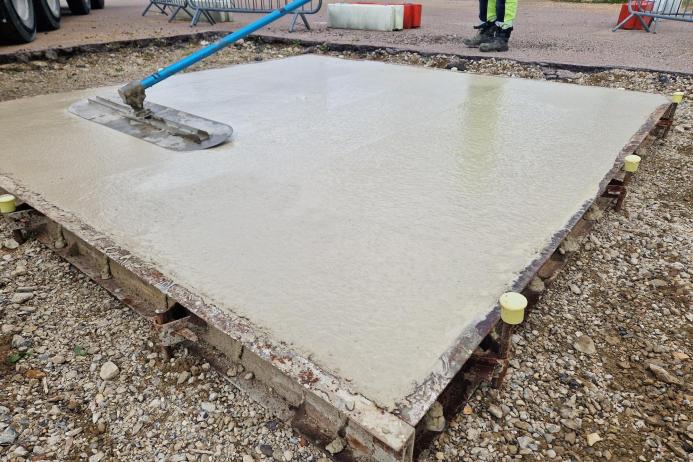Cemex support lower-carbon concrete trials at Heathrow
Company partners with Heathrow Airport and Ecocem to trial lower-carbon concrete solutions
CEMEX have announced a partnership with London Heathrow Airport and Ecocem on trials to explore the viability, durability and longevity of lower-carbon concrete in a real airport setting.
Initially two lower-carbon solutions will be tested – a pavement-quality concrete (PQC) equivalent mix containing 50% ground granulated blast-furnace slag (ggbs), and a zero-clinker product.
The concrete will be trialled in a pouring site under the airport control tower as part of a phased process to test its strength and durability in the field. The project, led by Jacobs and implemented by Cemex and Ecocem, will see the lower-carbon concrete assessed for use in main airport areas, groundworks and for auxiliary purposes.
With aircraft taking off and landing every 45 seconds (pre-pandemic), it is critical that the concrete undergoes rigorous testing to ensure it can withstand the demands of the one of the world’s busiest airports. The aim is for the trial’s findings to be used to set out a blueprint that other airports, keen to reduce carbon from all facets of their operations, can follow.
Richard Kershaw, technical manager at Cemex, said: ‘We were the first supplier in the UK to launch a net-zero concrete product, making us ideally situated to support Heathrow with its lower-carbon concrete trial. We hope this trial will prove successful and demonstrate the opportunities available to cut emissions during the aviation sector’s development projects.’
Nigel Milton, chief of staff and carbon at Heathrow, commented: ‘Heathrow is once again serving as a testbed for ground-breaking technologies, demonstrating global leadership with regards to sustainable travel.
‘We’re committed to cutting carbon emissions on the ground as well as in the air and we’re delighted to be hosting one of the first airport trials in the world to test lower-carbon alternatives. I hope that this trial will help radically transform the built environment at Heathrow in the years to come.’
Mark Till, UK national sales manager at Ecocem, said: ‘Our technical solutions have long helped large-scale infrastructure projects to reduce carbon emissions across Europe. Having the opportunity to partner with Heathrow airport on a project with huge potential in the UK and for the aviation sector is testament to the innovation of our products and team.’
Richard Moore, Europe aviation engineering lead at Jacobs, said the trial was an exciting milestone in the development of lower-carbon infrastructure solutions at the airport and marked the culmination of four years of research and planning that will form the foundation of further work exploring other lower-carbon products and materials.
‘Testing the materials in a range of airport infrastructure applications, not just runway and taxiway pavements, allows us to maximize the opportunity to reduce embedded carbon in a wide variety of concrete types,’ he remarked. ‘Building on the success of the trial, we look forward to upscaling to usage in airfield projects being delivered by Ferrovial Construction, Dyer and Butler and other major programme partners across the airport.’










